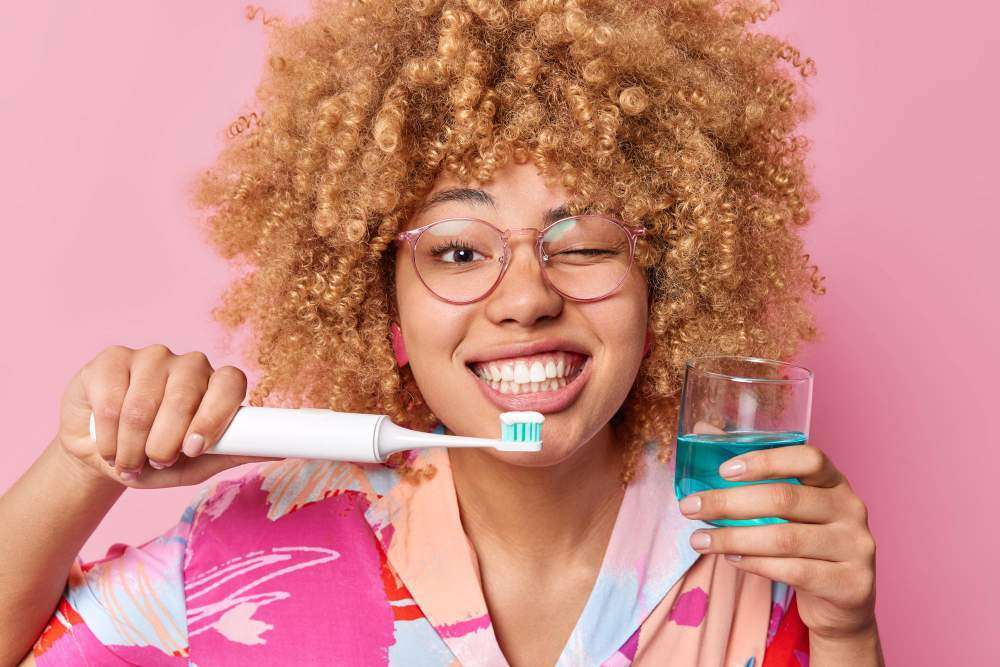
Maintaining good dental health is crucial for overall well-being. Poor oral hygiene can lead to a lot of problems, like cavities, gum disease, and tooth loss. Therefore, adopting a good dental health routine that promotes healthy teeth and gums is essential. In this brief blog, we will talk about the best process for dental health.
1. Brushing
Making sure to brush your teeth at least twice a day is crucial for good dental health. Use a soft-bristled toothbrush to avoid irritation and fluoride toothpaste to brush your teeth. Keep your brush at a 45-degree angle to your teeth, and gently brush in circular motions. Be sure to brush all surfaces of your teeth, including the front, back, and top. Brush your tongue gently to get rid of bacteria as best as you can and to freshen your breath. Make sure you brush your teeth for at least two minutes each time, and don’t rush through it.
Use gentle pressure and avoid brushing too hard, as this can damage your tooth enamel and gums. If you notice some dental issues remaining even after you’ve started brushing properly, don’t worry. It often happens that even with proper brushing techniques, some bacteria manage to sneak past. In this case, head over to Terrigal Dental so they can clean you up promptly and effectively.
2. Flossing
Flossing is another important step in maintaining good dental health. It helps remove food particles and plaque between your teeth and gum line. Make sure to floss your teeth once a day, using a gentle back-and-forth motion. Be sure to use a fresh section of floss for every tooth you floss to avoid spreading bacteria. To have excellent oral health, you must havea winner’s mentality approaching this.
Mouthwash
Mouthwash can be a useful addition to your dental health routine, but it is important to use it correctly. Rinsing your mouth with mouthwash can help kill bacteria in your mouth, freshen your breath, and promote healthy teeth and gums. However, it should not be used as a substitute for brushing and flossing. Mouthwash can be a helpful tool for reducing plaque and gingivitis, but it is not a cure-all for dental problems. Also, choosing a mouthwash that suits your needs and avoiding using too much is important. Overuse of mouthwash can cause dry mouth and other dental problems. Always follow the instructions on the label and talk to your doctor if you have some concerns.
3. Healthy Diet
Eating healthy is crucial for maintaining good dental health. Foods that contain a high amount of sugar and acid can cause tooth decay and erosion. Instead, choose foods that are rich in calcium, vitamin D, and other nutrients that promote healthy teeth and gums. Foods such as milk, cheese, yogurt, leafy greens, and whole grains are excellent choices. Drinking plenty of water is also essential; it helps to wash away food particles and keep your mouth hydrated. Avoid snacking between meals, as this can increase your risk of tooth decay. You can promote good dental health and overall well-being by eating a healthy diet and limiting your intake of sugary and acidic foods.
4. Regular Dental Check-Ups
Regular dental check-ups are crucial for maintaining good dental health. Give your dentist a visit at least twice a year for a routine check-up and cleaning. Your doctor will examine your teeth and gums for gum disease, signs of decay, or any other dental problems. They will also get rid of any plaque and tartar buildup.
5. Dental Treatments
Sometimes, despite your best efforts, dental problems can still arise. In such cases, your dentist may recommend dental treatments to restore your dental health. Dental treatments such as fillings, root canal therapy, and dental implants can help to restore damaged teeth and gums.
6. Quit Smoking
Saying goodbye to smoking is one of the best things you can do for your dental and overall health. Smoking causes bad breath and stains on your teeth and increases your risk of gum disease, tooth loss, and oral cancer. Nicotine can restrict blood flow to your gums, making it harder for them to heal after dental procedures or injuries. Quitting smoking can help reduce these risks and improve your overall dental health. Additionally, it can benefit your overall health by reducing your risk of lung cancer, heart disease, and other health problems. If you need help quitting smoking, speak to your doctor or a smoking cessation specialist.
7. Buy a New Toothbrush Every Three to Four Months
This can be done potentially sooner if the bristles are frayed or worn out. A worn-out toothbrush is less effective at removing plaque and can harbor bacteria. Finally, consider using an electric toothbrush, which can be more effective at removing plaque and promoting good oral hygiene. Good dental health is not just about having a beautiful smile – it’s about keeping your teeth and gums healthy and preventing dental problems that can affect your overall health.
All in all, adopting a good dental health routine is crucial for maintaining healthy teeth and gums. Follow the steps we have mentioned above to notice oral health improvement and the number of oral problems you experience reduced significantly. Keep in mind that prevention is always the best alternative. It’s a lot cheaper and a lot less painful than clinical treatments.